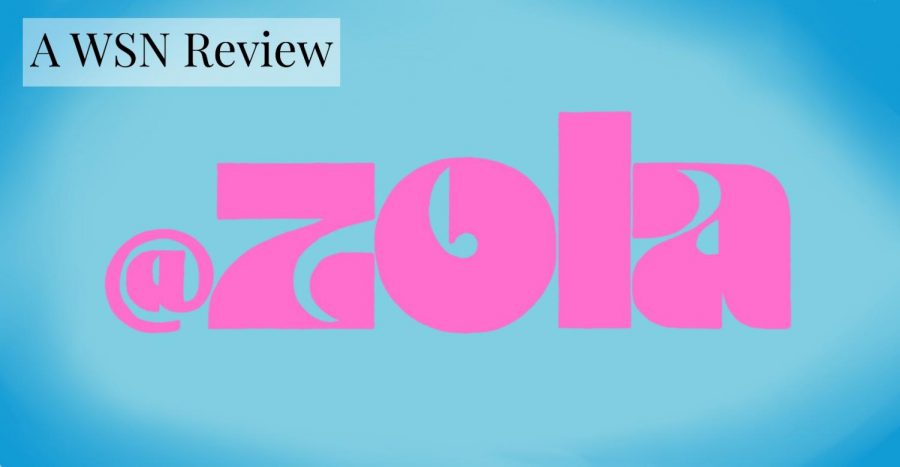Janicza Bravo Q&A event: A glimpse inside the director’s mind
In anticipation of her movie “Zola,” NYU alumna Janicza Bravo gave a Q&A session to students about navigating the film industry.
Zola is a biographical comedy-drama film directed by Janicza Bravo. Janicza Bravo, an NYU alum, gave a Q&A session for NYU students. (Staff Illustration by Manasa Gudavalli)
May 3, 2021
In a collaboration between A24 and the NYU Program Board, Janicza Bravo, NYU alumna and director of the upcoming movie “Zola,” gave a remote Q&A session for NYU students. In the intimate session, moderated by Tisch sophomore Myles Madden, a small number of students had the opportunity to ask Bravo about her experience within the film industry. During the candid and inspiring session, Bravo delved into personal experiences spanning her career from her time at NYU to her transition from theater to film and television directing. Finally, she reflected on her most recent work, “Zola.”
After Madden introduced her, Bravo began the session by talking about her decision to be a director. Though she came to NYU to pursue theater, an instructor told Bravo that she was destined to be a director instead.
Bravo was initially discouraged by the professor’s advice — she had a hard time seeing herself succeeding in a field with so few Black women. “I wasn’t able to cite anyone who looked like me who was doing that,” she said.
It is now evident that Bravo has found her calling in directing, paving a way for many more Black women to direct in the future.
When asked about how she made the transition from theater to film, she explained that after graduating from NYU, she moved to Los Angeles. She initially planned to stage direct, but she dropped that plan when a director of photography for the television show “Atlanta” approached her about directing. She began writing scripts for short films. Bravo explained that her life changed when her 2011 short “Eat” was accepted into South by Southwest.
After the success of “Eat” and other shorts and TV episodes, she went on to co-write and direct her first full-length movie, “Lemon,” in 2017. Within a year of its release, Bravo was hired to direct “Zola,” the primary topic of the second half of the Q&A session.
“Zola” is based upon a 148-tweet Twitter thread that Aziah “Zola” King, a waitress and stripper from Detroit, wrote in 2015. The thread detailed her wild experience going to Florida with a girl named Jessica, Jessica’s boyfriend and a pimp in a story involving murder and sex trafficking.
Like many other Twitter users, Bravo was captivated by the story when it was tweeted about internationally as #TheStory. The story immediately garnered a lot of attention from film studios for a potential adaptation. Yet Bravo wasn’t initially selected to direct it.
When the story was once again in need of a director in 2017, Bravo expressed the things she wanted to bring to the project. She wanted to make sure Aziah King — the original Zola — was a part of the project. King’s approval was her number–one priority.
“If she likes it, then it doesn’t really matter what else happens,” Bravo said. “Because I made her feel seen, I made her feel heard, I’ve materialized this event that happened to her, and she is the one that will forever have the tangible object of what she lived, so her read of it is the top read.”
She emphasized that she made “Zola” in a way that no one else would have, especially since the last group to be in control of the project was predominantly made up of white men. When asked to compare their possible version of “Zola” to her own interpretation of the story, she replied “If their movie is on Earth, then my movie is whatever planet is the farthest away from Earth.”
Bravo also spent the Q&A emphasizing her directorial intentions with the “Zola” project, talking about how she envisioned the look and feel of the film and how her directorial choices influenced the story.
“I wanted to imbue it with this sort of rosy patina that I feel the way little girls retell stories, and I wanted to recast it in a way where everything looked and felt a little bit more beautiful than it might’ve been,” Bravo said.
When Madden asked about the key references Bravo used to formulate the world within “Zola,” she emphasized how photography has always been an integral part of developing her filmmaking. She was also inspired by movies such as “Paris Is Burning” and “The Wiz,” even referring to “Zola” as “the ratchet ‘Wizard of Oz’” where, instead of making three friends, Zola gains three enemies.
She emphasized that the experience of watching “Zola” is not intended to be particularly comfortable, due in large part to the fact that the disturbing story is entirely true. Bravo emphasized the unsettling truths of the story through its colors, costume design, score and cinematography. She said that her version of the story should feel like 90 minutes spent eating cotton candy, gummy bears, diet coke and red bull. “You should be like, ‘That was fun, but like, I don’t feel right,’ and that’s the movie,” she said
Bravo showed both her love for filmmaking and her dedication to helping aspiring filmmakers through the anecdotes and details of her creative process she shared. It also displayed Bravo’s dedication and commitment to storytelling and authentically bringing a story like King’s onto the big screen.
“Zola” hits theaters nationwide on June 30.
Email Sofia Carr at [email protected].
























































































































































